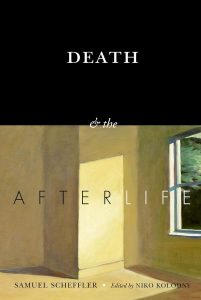
Synopsis from Amazon:
Suppose you knew that, though you yourself would live your life to its natural end, the earth and all its inhabitants would be destroyed thirty days after your death. To what extent would you remain committed to your current projects and plans? Would scientists still search for a cure for cancer? Would couples still want children?
In Death and the Afterlife, philosopher Samuel Scheffler poses this thought experiment in order to show that the continued life of the human race after our deaths–the “afterlife” of the title–matters to us to an astonishing and previously neglected degree. Indeed, Scheffler shows that, in certain important respects, the future existence of people who are as yet unborn matters more to us than our own continued existence and the continued existence of those we love. Without the expectation that humanity has a future, many of the things that now matter to us would cease to do so. By contrast, the prospect of our own deaths does little to undermine our confidence in the value of our activities. Despite the terror we may feel when contemplating our deaths, the prospect of humanity’s imminent extinction would pose a far greater threat to our ability to lead lives of wholehearted engagement. Scheffler further demonstrates that, although we are not unreasonable to fear death, personal immortality, like the imminent extinction of humanity, would also undermine our confidence in the values we hold dear. His arresting conclusion is that, in order for us to lead value-laden lives, what is necessary is that we ourselves should die and that others should live.
My Comments:
“I don’t care what happens after I die.” Apparently you do care, in ways you are not consciously aware of. Beyond making a will, or being concerned about your valued possessions, or what happens to your close relatives, friends, pets- you do care more than you initially think. This is Scheffler’s topic: that our connections to all of the humanity (mostly strangers) that comes after us, after we die, is a major cause of why we value being alive now. This connection is a feature of how our minds work.
This is not a book about suicide or depression. It is not even really about “the afterlife” in the sense of a personal or spiritual afterlife. It is about the opposite of these topics. It is about why we value this opportunity to be alive. Samuel Scheffler is a philosopher at NYU who explores thought experiments in which there are no humans left alive some short time after we ourselves die. He believes that when most people imagine this scenario it takes something significant away from the pleasures of being alive.
Is it true that we have a deep sense of being connected to that river or ocean of all people, born and not yet born, stretching into the future? And is this an important part of what makes our current lives meaningful? Scheffler doesn’t give experimental evidence to support his conclusion, or collect data from individuals which might support or refute his ideas. This book is a series of professional philosophy lectures. It is not an easy read for a non-philosopher (or a psychiatrist). In fact, on page 31 he says that evolutionary explanations (and I guess other scientific explanations) are irrelevant and would detract from his thesis. I believe the opposite. If we come to know the mechanisms by which we connect to our species’ future, we can use this to help us now. My own unproven speculation is that when we imagine our own deaths, there is always an implicit assumption that our own self will somehow be there, watching.

 Book Review: Four Thousand Weeks: Time Management for Mortals
Book Review: Four Thousand Weeks: Time Management for Mortals
Leave a Reply